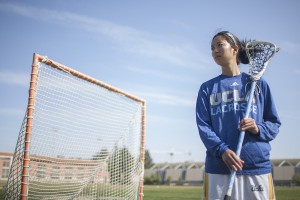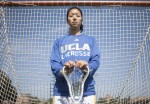A group of about 40 members of the UCLA women’s club lacrosse team stood around the Intramural Field waiting to meet their new coach.
Their former coach left the team just a month before the regular season began. The Bruins had to scramble, calling up Paige Lin to replace a coach who was too busy focusing on making sure everyone had a good time.
If she was going to be coach, Lin remembered thinking, she was going to do it right. The first thing she did in her first practice was have everyone run sprints.
“I don’t think they were expecting that,” Lin said. “I think they were all expecting, ‘Oh, it’s the coach’s first day. We’re probably just going to show off our lacrosse skills.'”
That was more than a year ago. Lin is now nearing the end of her second season on the job. Lin says her sustained commitment to intensity was integral to the team winning the Western Women’s Lacrosse League championship and earning the No. 5 seed for nationals.
In recognition, Lin was named the WWLL Division I Coach of the Year.
Despite all she’s accomplished, Lin is just 24 years old and started on the job less than a year after graduating from American University, a Division I women’s lacrosse school, as a four-year starter.
Coaching was a natural transition for the player who always looked up to her coaches as role models. As a high school senior, Lin coached the younger players on the team. Then, in college, she helped coach the club team she played for in high school.
After finding her way to UCLA, Lin brought that NCAA Division I intensity to the club level.
“When Paige came, she was really set on making sure our team is actually going to go somewhere and be successful,” said Sam Fletcher, a second-year business economics student and midfielder. “She’s very intense, but that was definitely what we needed at that time.”
Lin brought a game plan to the team that she believes caught other teams off guard in a league where most teams recycle the same strategies year after year. She incorporated what she has observed from basketball and soccer to the different schemes she saw in college.
She also made sure that the Bruins were never surprised by the strategies of their opponents by bringing over video scouting from her NCAA days, something Lin said only one other team in the league does.
(Erin Ng/Daily Bruin senior staff)
Lin puts together highlight reels of the UCLA team and films opposing teams to show the players what they might play down the road.
As for traditional scouting, Lin said she feels that it has always been one of her strengths.
“Other teams scout. I don’t think everybody is great at it, and I think we do it the best,” Lin said.
What really sets Lin apart from the rest can be seen in her practices.
As Lin puts the team through regular workouts, she’s not just standing on the sideline, arms crossed and whistle in mouth. She jumps into drills and scrimmages, proving she can still play.
Lin does so because sometimes there aren’t enough bodies for a full scrimmage, but she also does it to help set the tone and make sure everyone’s really paying attention, bringing a different level of intensity to practice.
“She’s very good, so it’s nice to play against that competition, and she motivates the team to work harder,” said Martine Ehrlich, a fourth-year psychology student and goalie. “She picks up the intensity when our energy may be low.”
Lin’s youth gives her the ability to participate in practice as much as she wants to, but her direct involvement in the team’s drills may also pose problems.
She’s only a couple of years older than the seniors on the team, and Lin doesn’t want her players to start thinking that she’s just one of their friends.
“Once you cross over to the ‘friend’ side, you’re not going to cross back, and you’re not going to get the same level of respect,” Lin said. “It’s a fine line to balance. You want to have their trust and respect and to develop that relationship with them, but I don’t want to go out on Thursday nights with them.”
If a player ever does ask Lin to join the team on a night out, the young coach could have a rather easy way to stay out of the “friend” zone.
The coach can just tell the player to run some sprints.
